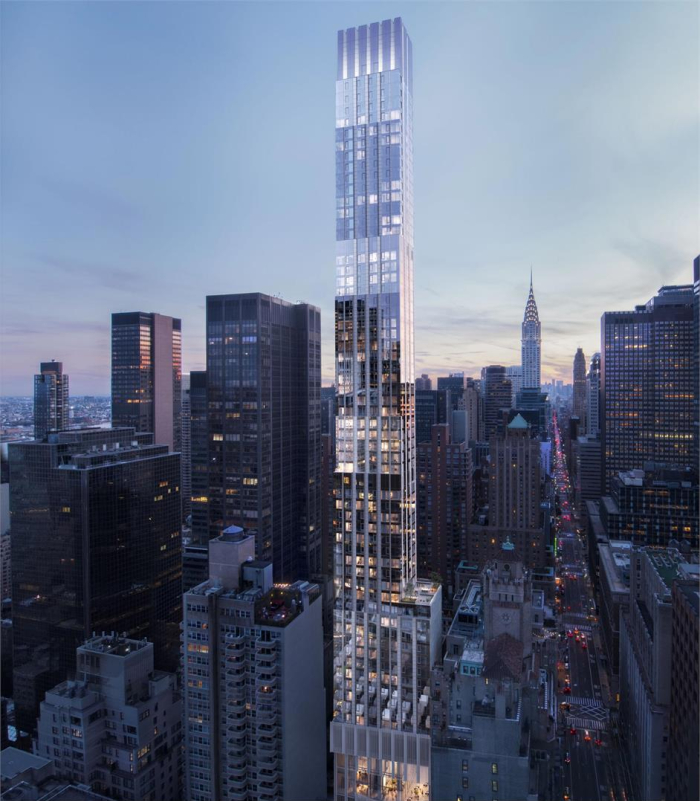Meritz Sec faces losses from $350 mn loan on NY condo
By Apr 05, 2021 (Gmt+09:00)
Lotte replaces 21 CEOs, slashes executive jobs by 22% in drastic reshuffle


Controversy brews over HYBE Chair Bang’s investment deal with PEFs


China’s Alibaba acquires 5% of Ably in 1st equity investment in Korean firm


Baby Shark becomes Youtube's No. 1 video with 7 bn views


Blackstone, Carlyle, MBK vying for CJ CheilJedang’s bio business



South Korea's Meritz Securities Co. is at high risk of incurring losses from its $350 million lending on a luxury condominium tower in Manhattan, New York, after its developer has been several months behind on interest payments on the loan, according to investment banking sources on Apr. 5.
In February 2020, Meritz provided a $350 million loan to the developer of The Centrale, collateralized on the unsold units of the 63-story residential tower in Midtown East of Manhattan. The tower consists of 124 condo residences and retail space on the lower level. At the time of the investment, most of the condo units were unsold.The developer Ceruzzi Properties had refinanced a $300 million construction loan on the skyscraper and Meritz underwrote the whole refinanced tranche worth $350 million. That was comprised of $240 million in senior debt and the remaining $110 million in mezzanine debt.
The financing had marked the first case for a South Korean company to provide loans on unsold assets, indicating their increased risk appetite for a higher yield.
Meritz had expected all the condo units will be sold within the next couple of years, given that two-thirds of the 124 residences are smaller than 132 square meters with one or two bedrooms. It is located near Central Park.
But the global pandemic and US property tax changes have put a dent in the US high-end residency market, despite the price of The Centrale condos being halved from up to $4 million per unit. New office supply under the Hudson Yards development, the largest US private real estate development, sapped demand for The Centrale as well.
In the worst-case scenario, Meritz's losses from the lending could amount to several hundreds of million dollars, according to the sources. It was not immediately known to whom the Korean brokerage company had sold down the debt investment.
"We tended to believe large buildings involving a global real estate company or a famous developer, or located in Manhattan, New York or Las Vegas were safe assets. But that tendency led to poor investments," said one of the sources. "When the COVID-19 recedes, we will see the light and shade of our overseas alternative investments clearly."
Domestic institutional investors also have faced losses from their 300 billion won mezzanine financing on the stalled Drew Las Vegas development. The developer Witkoff Group defaulted on a $2 billion project loan in May of last year, after its construction was shelved due to the COVID-19 pandemic. Earlier this year, its senior lenders decided to sell the security interest on their loans to a third party.
Last month, the regulatory Financial Supervisory Service said that the combined balance of overseas real estate investment funds sold in the country saw a drop in their net asset value below the original value by 400 billion won at the end of last year. It marked the first time for global property funds marketed in the country to log a month-on-month decline in their net value since February 2008, at the height of the global financial crisis.
Write to Ye-Jin Jun at ace@hankyung.com
Yeonhee Kim edited this article.
-
 Alternative investmentsKorea's global real estate fund investors brace for losses
Alternative investmentsKorea's global real estate fund investors brace for lossesMar 25, 2021 (Gmt+09:00)
3 Min read -
 Alternative investmentsKorean investors face $270 mn loss on Las Vegas hotel loans
Alternative investmentsKorean investors face $270 mn loss on Las Vegas hotel loansFeb 12, 2021 (Gmt+09:00)
2 Min read -
 Meritz Sec raises risk appetite with $350 mn loan on NY condo tower
Meritz Sec raises risk appetite with $350 mn loan on NY condo towerFeb 26, 2020 (Gmt+09:00)
1 Min read


